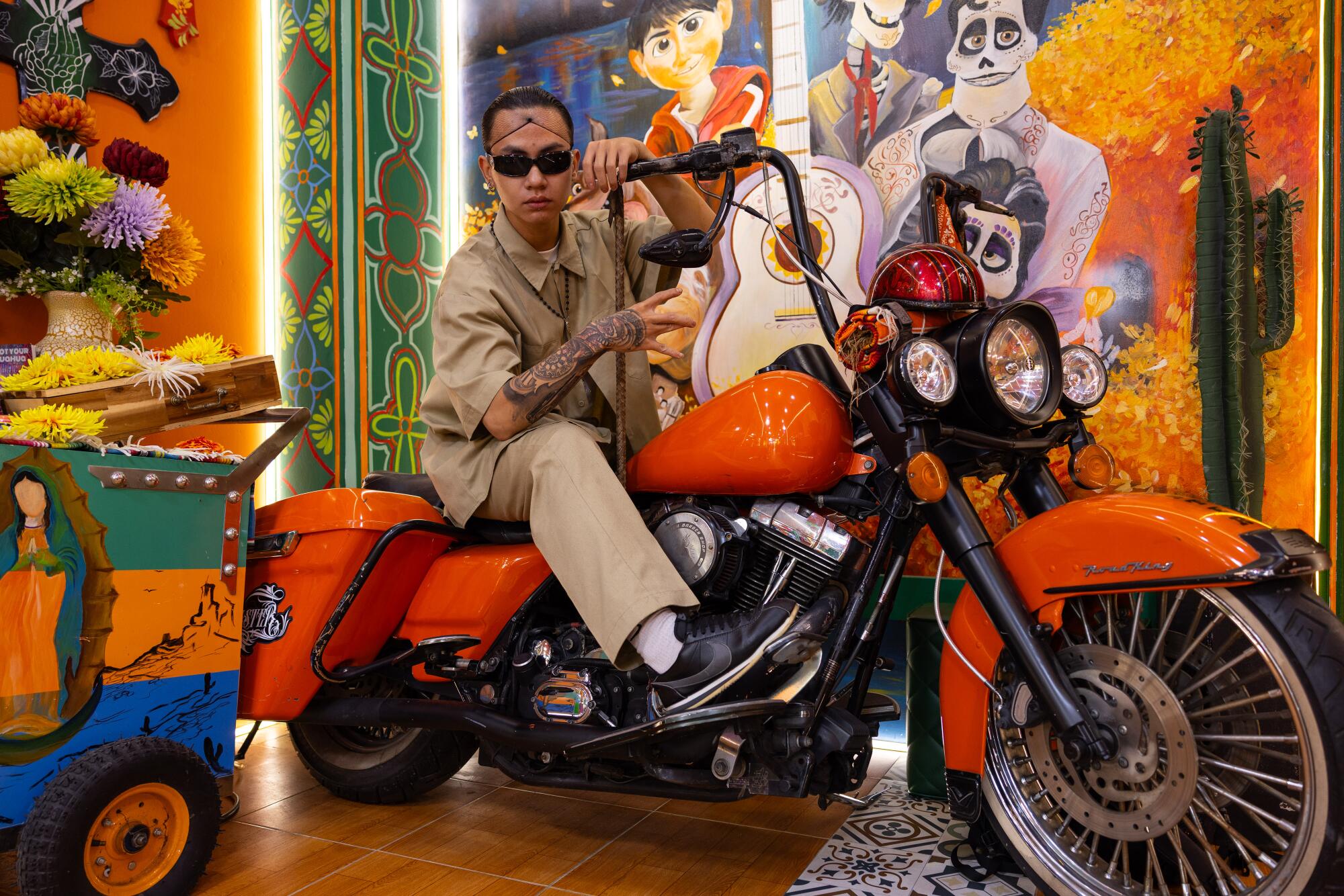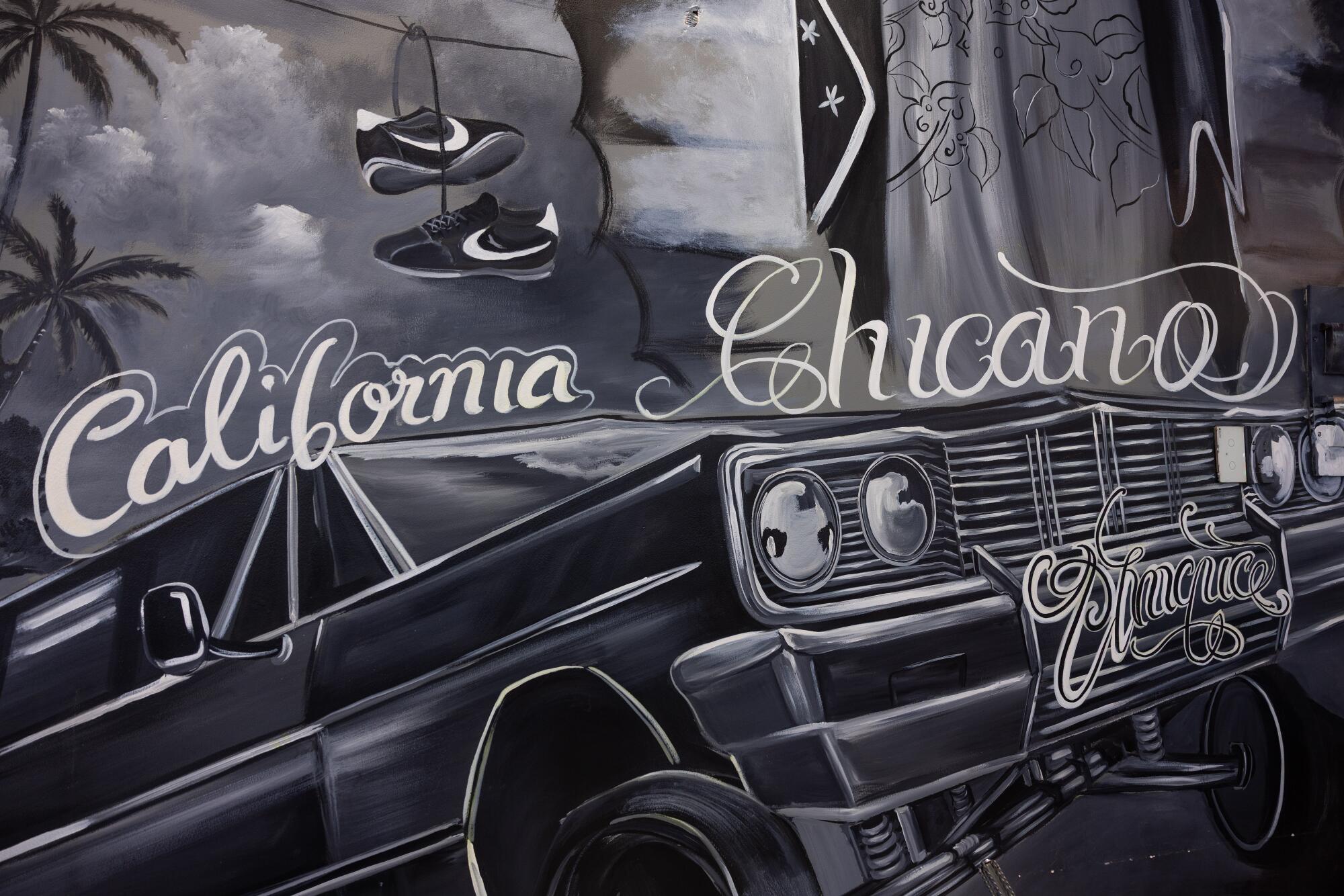HO CHI MINH CITY — When Nguyen Phuoc Loc first began dabbling in Chicano tradition eight years in the past, it was just because he preferred the way in which that the free clothes offset his massive head.
At present, he considers himself Chicano by means of and thru. The 30-year-old Vietnamese barber has by no means been to the USA. But he has stuffed his life and work with tributes to Mexican American id and tradition.
The again of the barbershop he manages includes a mural of the Virgen de Guadalupe, a cactus plant and a Mexican flag. Sneakers cling by their laces from barbed wire, dangling above two motorbikes.
Vietnamese barber Nguyen Phuoc Loc’s head is roofed with tattoos. The left aspect is inked with the Spanish phrase for household — familia.
Even his shaved head is roofed within the Gothic black letters lengthy standard in Chicano tradition that spell out: Household, Loyalty, L.A. The ink on his crown — a big quantity 6 — signifies his standing because the sixth member of a small however more and more seen group: an area band of barbers and tattoo artists who name themselves Viet Chicanos.
“In the beginning, I was just copying the older guys, their style and all,” stated Loc, 30. “But over time, I started to feel that it really fit who I am. It happened gradually, like it seeped into me.”
Vogue apart, the tradition has given Loc a way of belonging, and motivation to work more durable at his craft. He started watching motion pictures steeped in Chicano tradition, comparable to “American Me” and “Blood In Blood Out,” whereas utilizing his restricted English and translation apps to learn concerning the motion on-line. He additionally began studying Spanish on Duolingo, however stated that the language has been tougher to choose up.
“If someone comes in from L.A., I’ll ask them everything I can about Chicano culture,” he stated. “It’s like they’re tuned in to the exact frequency I’ve been on.”
As soon as a derogatory title for Mexican Individuals, the time period “Chicano” was reclaimed as a political id in the course of the Sixties, born out of their struggle for civil rights within the American Southwest.
Since then, symbols of Chicano id, comparable to outsized streetwear, elaborate tattoos and lowrider vehicles, have permeated mainstream tradition. Subcultures influenced by Chicano imagery have cropped up in different elements of Asia, comparable to Thailand, the Philippines and most notably Japan, the place an area love of lowriders emerged as early because the Nineties.

Armando Rendon, proper, a member of the Nationwide Mexican-American Anti-Defamation Committee, holds a chart illustrating a key grievance — that Mexican Individuals had been dying in Vietnam “at a higher rate, highly disproportionate to their numbers in the total population of the United States” — at a information convention in Washington, D.C., in August 1970.
(Bettmann Archive)
Inside conservative Asian cultures, the adventurous clothes and accessories of Chicano tradition are a big a part of the attraction, stated Ignacio Lopez Calvo, a professor at UC Merced who has studied the unfold of lowrider tradition in Japan.
“It’s a way of defying traditional societal norms,” he stated. “They see Chicano culture, this rebelliousness, resilience, independence, and it’s a way to express themselves, find an identity and create community.”
Berta Delgado Melgosa, a Spanish author who has studied Chicano literature written by veterans of the Vietnam Battle, says Chicano troopers there recognized with sure elements of Vietnamese tradition, whereas Chicano activists protested the racial inequality of the draft at residence.
“When the Mexican American soldiers arrived in Vietnam, they saw people that resembled them: their facial features, their clothes, even their hats. They were poor, worked in the fields, and they also had a great sense of community, and more importantly, they were also fighting for their lives against U.S. imperialism,” she stated.

Nguyen Phuoc Thien, who goes by Tea, poses on a bike on the Chicano-themed barbershop the place he works in Ho Chi Minh Metropolis.
(Chris Trinh / For The Occasions)
Vietnam’s personal Chicano “movement” started 10 years in the past, when Nguyen Huynh Thanh Liem opened a barbershop devoted to Chicano tradition in Ho Chi Minh Metropolis. Now, the 38-year-old runs about 20 barbershops throughout the nation, together with three Chicano-style retailers, and trains barbers comparable to Loc.
Tran Quoc Viet, a 37-year-old used automotive salesman, turned a daily buyer of Liem’s Barber Store shortly after the primary one opened in 2015. Again then, he was intrigued by the bizarre aesthetic. Whereas he by no means adopted the fashion of dishevelled clothes or tattoos, he was impressed with how the barbers pulled it off.
“At the time it could be called rebellious,” he stated. “There was something bold and edgy about it, which made me curious.”

An apprentice on the Viet Monster Hood salon in Ho Chi Minh Metropolis inks a tattoo on a buyer.
Most of the Vietnamese drawn to Chicano tradition attribute their preliminary admiration to the intense colours and daring contrasts that Liem showcases in his signature retailers.
The unconventional aptitude of the barbershops offers them a singular attraction, and in the previous couple of years, social media has helped the group increase its profile and acquire a wider viewers past Vietnam. Liem has greater than 680,000 followers on TikTok, the place he posts about Chicanos in Vietnam. Loc has 1.2 million TikTok followers; his hottest movies every have about 30 million views.
Nonetheless, that spotlight hasn’t all been optimistic, notably amongst older generations of Vietnamese, who’re inclined to affiliate tattoos with gangs and violence.
“In Vietnam, when people see something new or unfamiliar, especially from another culture, they don’t always welcome it,” stated Nguyen Van Thao, a 35-year-old tattoo artist who works at one other one among Liem’s retailers. “People often mock or even insult us on social media, saying things like, ‘You’re Vietnamese, why don’t you just be Vietnamese? Why do you have to be like that?’”
Thao started exploring Chicano-style tattoos with Liem when the 2 of them met 10 years in the past. At the moment, their body of reference got here principally from on-line photographs. As they delved deeper into Chicano tradition, Thao discovered that many different points resonated with him, such because the emphasis on household, resilience and respect.
“People often ask me why I chose this culture, but the truth is, I didn’t choose it. I discovered it, and it felt more like it chose me,” Thao stated. “People come here, they hang out, they get inked, they support what we do. They helped me turn my life around.”
The stigma related to tattoos and streetwear in Vietnam has performed a task in retaining the core group small. Whereas details about Chicano tradition has elevated, those that are steadfast sufficient to face up to the stares and study concerning the underlying values are those who final, Thao stated. He speculated that such social scrutiny places undue stress on ladies who’ve explored the Chicano group and determined to not keep.
“There are actually a lot of people who do like the culture — I know many who really do — but they’re hesitant,” he stated. “They’re afraid of being stared at, judged, talked about, attacked. They can’t handle the criticism, so they give up.”

Tattoo artist Nguyen Van Thao poses for a portrait at Viet Monster Hood.
About 10 devoted members of the group and their households typically cycle out and in of Liem’s flagship salon, Viet Monster Hood, to work and socialize.
The Viet Chicanos are cautious of attracting the improper kind of followers as properly, who could also be in pursuit of a distinct sort of life-style. Regardless of their fierce appearances, most of the barbers who work at Liem’s retailers are soft-spoken and humble and reject any perceptions of violence and crime. They are saying they need to perpetuate cultural appreciation, quite than appropriation.
“We’re just inheriting this culture from a distance. And in doing so, we choose to carry on the beautiful parts,” Thao stated. “We believe we can succeed this way, so that when people look at this culture, they see it connected to real success. And they see that the people who follow it are decent people, and we don’t have to be gangsters to be considered a true Chicano.”

Vietnam’s Chicano “movement” started 10 years in the past, when Nguyen Huynh Thanh Liem opened a barbershop devoted to Chicano tradition in Ho Chi Minh Metropolis. Now, the 38-year-old runs about 20 barbershops throughout the nation, together with three Chicano-style retailers.
When tattoo artist Michael Phan, 25, moved from Munich, Germany, to work for Thao two years in the past, his solely thought of Chicano tradition was the superficial notion that it’s related to gangs. However his time at Viet Monster Hood modified that. Now, he likes to quote a quote from “Blood In Blood Out” that’s framed on the wall on the salon: “Chicano is not a color, but it’s the way you think and the way you live.”
“I love that, because it means you don’t have to be in America to embrace it,” he stated.
Studying from Thao has helped Phan develop his social media following and his enterprise, although his purchasers are nonetheless principally foreigners. Whereas he’s realized that Chicano and Vietnamese tradition have quite a lot of similarities — comparable to prioritizing household — he believes that Vietnamese, together with his kin, could take longer to return round.
For 60-year-old Nguyen Thi Bich, who was taught that individuals with tattoos are harmful, stepping foot in Viet Monster Hood was intimidating at first. Nonetheless, she relaxed after seeing how cheerful the barbers had been when teasing her 7-year-old grandson.
“When we went to other barbershops where people were grumpy, my little grandson got scared and didn’t want to go back,” she stated. “Now I have been around people with tattoos, getting to know them, I realized there are all kinds of people everywhere.”
Whereas she’s nonetheless unfamiliar with what Chicano means, she’s grown keen on the surroundings at Viet Monster Hood, the place decals that say “Vietnamese Gang,” are in all places, hip-hop blares within the background and even the store bulldog, Simba, has drawn-on tattoos.
“This shop feels like one of those places where young people go to rap,” she stated. “I’ve been watching rap on TV lately, and I quite enjoy it.”


